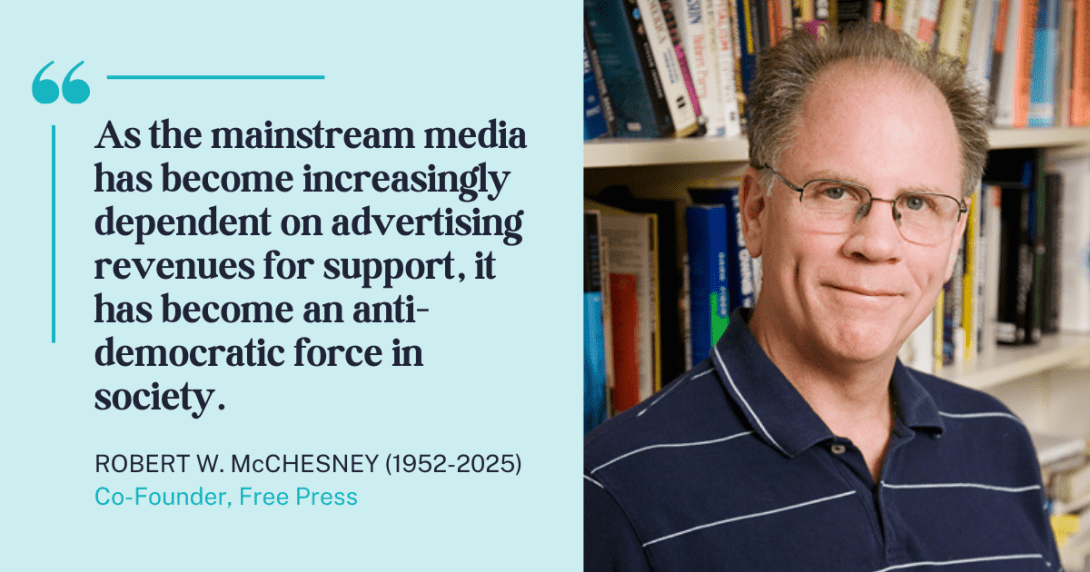Remembering Robert W. McChesney

Robert W. McChesney, the renowned media scholar and co-founder of Free Press, died on March 25 at his home in Madison, Wisconsin. He was 72.
Professor McChesney — Bob to his friends — was an intellectual force who changed the way a generation of academics, journalists, politicians and activists thought about how the media shape our broader politics and possibilities. In 27 books that he authored or edited — and during 30 years of teaching at the Universities of Illinois and Wisconsin — he not only chronicled the problems of the media but offered a bold vision for how to transform it.
Bob believed in turning ideas into action — which is why he co-founded Free Press and served on its board of directors for many years. He believed that for far too long, policymakers had made crucial decisions about the media in the public’s name but without its consent.
He spent many years crisscrossing the country giving speeches, doing book readings, teaching in classrooms, and showing up at community-radio stations and public-access studios to tell people what was really going on. I opened for him on a few of those tours and can testify to his unique ability to express supposedly radical ideas as common sense.
Bob McChesney never gave up hope
While an already flawed media system underwent many dangerous and discouraging changes during his lifetime — from the rise of Fox News and Facebook to the dominance of Rush Limbaugh and Elon Musk — Bob never lost faith in small-d democracy.
“The source of my optimism remains that in any group I meet with, there will be overwhelming support for making fundamental change,” he told me in an interview last year about Free Press’ 20th anniversary. “If I went into a room and they said, no, I think we should pay more for cell phones, or I think journalism is too good, there’s too much good information, then I would say it’s hopeless. It would be a tougher fight if people saw the world that way. And I extend that more broadly to political organizing. On issue after issue, people tend to be pretty progressive. But they don’t have that opportunity to reflect that in our political culture and don’t see that reflected very often in our media culture.”
Bob knew that transformative change was a long-haul project. But he had little patience for tinkering around the edges. Rather than fighting over Washington’s narrow vision of what was possible, he always said — and Bob loved a good sports metaphor — that we needed to “throw the puck down to the other end of the ice.”
Bob was a generous mentor to me and so many others who made his cause our life’s work. I will miss his frequent calls to kick around new ideas, to push us to think bigger and to be bolder. I will miss his warmth, his kindness and his conviction that change was possible — and that another critical juncture to make it happen might be just around the corner.
Carrying forward his vision
While news of his death is devastating, there has been some solace in seeing people share their memories and beginning to understand just how many people he reached and inspired. Media scholars from around the world have posted on social media about his influence, insights, inspiration and ideas. Joshua Benton of Nieman Lab published an excellent guide to Bob’s books and influential writing.
Journalist David Sirota called Bob “a mentor, an inspiration, a truth teller, and a hero to me.” Democracy Now! aired an appreciation of Bob and reshared one of his many interviews on the program. Former FCC Commissioner Michael Copps said Bob was “a pioneer and prophet in media studies [who] taught and warned a generation about big corporate media’s threat to our democracy.”
Bob’s friend Jeff Cohen, the founder of Fairness & Accuracy In Reporting (FAIR), wrote a tribute. So did Dean Baker of the Center for Economic and Policy Research and media critic Dan Kennedy, who concluded: “Bob’s North Star has always been a better society served by truly democratic media. The shame of it isn’t that his ideas were unrealistic. It’s that they were dismissed as unrealistic by those who stood to benefit from corporate power.”
If you read just one article, I recommend the remembrance in The Nation from his closest friend and constant collaborator (and Free Press co-founder) John Nichols. As he writes about Bob: “He was a globally respected communications scholar who was wholly welcome in the halls of academia, yet he was never satisfied working within an ivory tower. He was a rigorous researcher into the worst abuse of corporate and political establishments. Yet he refused to surrender his faith in the ability of people-powered movements to upend monarchs and oligarchs.”
That’s a faith we need in this moment more than ever. That’s why we at Free Press remain committed to carrying forward this work and his vision.
“Bob’s vision for a truly democratic media system lives on,” wrote University of Pennsylvania Professor Victor Pickard, who chairs the Free Press board and is Bob’s former graduate student and intellectual heir. “To honor him, we must continue the struggle.”
Help Free Press keep fighting for journalism that serves democracy: Donate today.